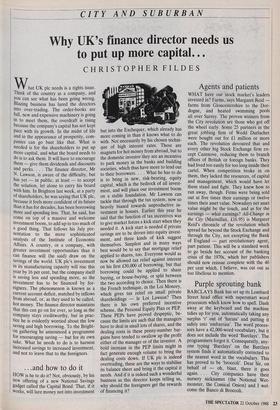CITY AND SUBURBAN
Why UK's finance director needs us to put up more capital...
CHRISTOPHER FILDES
What UK plc needs is a rights issue. Think of the country as a company, and you can see what has been going wrong. Blazing business has lured the directors into over-trading. The order-books are full, new and expensive machinery is going In to meet them, the overdraft is rising because the company's capital has not kept pace with its growth. In the midst of life and in the appearance of prosperity, com- panies can go bust like that. What is needed is for the shareholders to put up more capital, and what the board needs to do is to ask them. It will have to encourage them — give them dividends and discounts and perks. . . . The finance director, Mr N. Lawson, is aware of the difficulty, but has yet — in public, at least — to accept the solution, let alone to carry his board with him. In Brighton last week, at a party of shareholders, he was saying that UK plc, because it feels more confident of its future than it has for decades, has been borrowing more and spending less. That, he said, has come on top of a massive and welcome investment boom, to add up to too much of a good thing. That follows his July pre- sentation to the more sophisticated analysts of the Institute of Economic Affairs. A country, or a company, with greater investment opportunities than it can finance will (he said) draw on the savings of the world. UK plc's investment In its manufacturing capacity will rise this Year by 16 per cent, but the company itself is saving less and spending more, so the investment has to be financed by for- eigners. The phenomenon is known as a current account deficit, matched by inflows from abroad, or, as they used to be called, hot money. The finance director maintains that this can go on for ever, so long as the company stays creditworthy, but in prac- tice he is evidently worried about the low saving and high borrowing. To the Bright- on gathering he announced a programme for encouraging saving — but for its own sake. What he needs to do is to harness increased savings to increased investment, and not to leave that to the foreigners.


































































 Previous page
Previous page